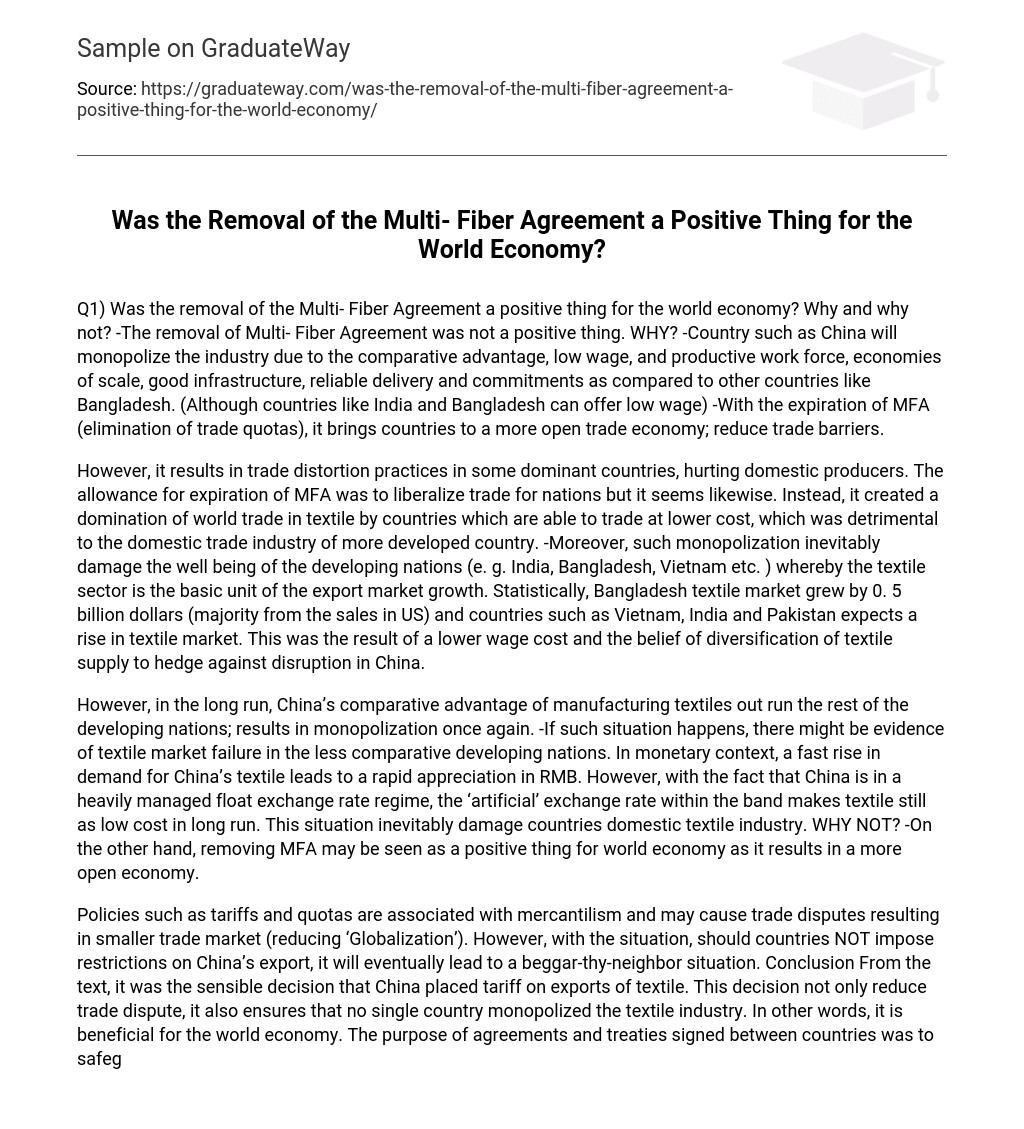Q1) Was the removal of the Multi- Fiber Agreement a positive thing for the world economy? Why and why not? -The removal of Multi- Fiber Agreement was not a positive thing. WHY? -Country such as China will monopolize the industry due to the comparative advantage, low wage, and productive work force, economies of scale, good infrastructure, reliable delivery and commitments as compared to other countries like Bangladesh. (Although countries like India and Bangladesh can offer low wage) -With the expiration of MFA (elimination of trade quotas), it brings countries to a more open trade economy; reduce trade barriers.
However, it results in trade distortion practices in some dominant countries, hurting domestic producers. The allowance for expiration of MFA was to liberalize trade for nations but it seems likewise. Instead, it created a domination of world trade in textile by countries which are able to trade at lower cost, which was detrimental to the domestic trade industry of more developed country. -Moreover, such monopolization inevitably damage the well being of the developing nations (e. g. India, Bangladesh, Vietnam etc. ) whereby the textile sector is the basic unit of the export market growth. Statistically, Bangladesh textile market grew by 0. 5 billion dollars (majority from the sales in US) and countries such as Vietnam, India and Pakistan expects a rise in textile market. This was the result of a lower wage cost and the belief of diversification of textile supply to hedge against disruption in China.
However, in the long run, China’s comparative advantage of manufacturing textiles out run the rest of the developing nations; results in monopolization once again. -If such situation happens, there might be evidence of textile market failure in the less comparative developing nations. In monetary context, a fast rise in demand for China’s textile leads to a rapid appreciation in RMB. However, with the fact that China is in a heavily managed float exchange rate regime, the ‘artificial’ exchange rate within the band makes textile still as low cost in long run. This situation inevitably damage countries domestic textile industry. WHY NOT? -On the other hand, removing MFA may be seen as a positive thing for world economy as it results in a more open economy.
Policies such as tariffs and quotas are associated with mercantilism and may cause trade disputes resulting in smaller trade market (reducing ‘Globalization’). However, with the situation, should countries NOT impose restrictions on China’s export, it will eventually lead to a beggar-thy-neighbor situation. Conclusion From the text, it was the sensible decision that China placed tariff on exports of textile. This decision not only reduce trade dispute, it also ensures that no single country monopolized the textile industry. In other words, it is beneficial for the world economy. The purpose of agreements and treaties signed between countries was to safeguard their domestic textile industry.
However the lift may be beneficial as countries that import from China are able to purchase at a lower cost price as compared to buying domestic produced textile. This can be referred to a win-win situation between importers and the China textile industry. Lastly, with the theory of contestable markets, China’s monopolization of the world textile industry is non-feasible due to the possibility of higher price charging which may eventually result to trade disputes. This may deter China industry to behave as a monopoly, therefore governs the competitiveness of China’s textile industry.





